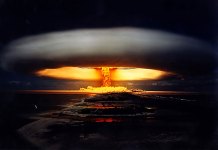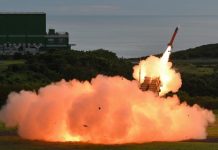Turkish President Recep Tayyip Erdoğan wants to show the world that his homeland, which rests on the Anatolian peninsula in Western Asia and on a smaller portion of Balkan Peninsula in Southeastern Europe, fears no one.
Malabar Turns Into QUAD As Australia Set To Join US, India & Japan In An Alliance Deemed Anti-China
Be it the rage of a military superpower, the United States of America or its own Mediterranean rival Greece, Turkey has surged ahead with its acquisition of the lethal Russian-made S-400 missile defence systems to becoming a master of its own destiny while taking no prisoners.
However, Ankara’s pursuit of achieving defensive superiority in the region against foreign threats may now be put on an indefinite hold, with Greek reports suggesting that the test-firing of the deadly missile systems have failed, a claim that EurAsian Times cannot verify.
Turkey, which had imported the lethal S-400 surface-to-air-missiles (SAMS) from Moscow in July of 2019, had reportedly been clearing its airspace and waters off the Black Sea coast for the missile’s testing.

According to news reports, areas near the coastal city of Sinop had already been restricted by the country’s authorities with aircraft also advised to avoid the area to a height of 200,000 feet (61,000 metres), while Ankara carried out a radar test and a live-fire of the missiles.
However, according to local media reports which include Greek website, Pentapostagma, the testing of the missile systems was unsuccessful. The key reason for the failure though has been claimed to be Turkey’s refusal to take assistance from Russian experts.
“The first military use of the S-400 missile defence system by the Turkish army failed due to Ankara’s refusal to assist Russian military special forces.”
Earlier, it was reported that Ankara had delayed the testing of the Russian missiles for a significant period of time after having identified defects in the missiles, which they had not been able to resolve on their own.
Moreover, the word from Moscow suggested that the Turkish Army didn’t possess the expertise or the knowledge to put the missiles on alert and would need the intervention and supervision of Russian technicians, which went against the instructions of Turkish authorities.
Earlier, a television channel named A Haber had said on its website that Turkey’s military test-fired the Russian S-400, with reports claiming that three missiles were shot hitting three targets.
“Three missiles of the S-400 anti-aircraft missile system were launched. All of them successfully hit the designated targets,” a source told Russian News Agency – Tass.
However, according to fresh intel, videos published by Turkish agencies show just the launch of the missiles, with no visuals of the targets being hit or a sound of an explosion of a missile warhead, creating confusion among many.
“The absence of a trace of a target flight, the absence of a missile warhead explosion and the straight course of a missile are alarming.” according to the report.
The news will come as a huge relief to the United States who had last week warned of “potential serious consequences” for its security relationship with Turkey if it activates the system.
“If confirmed, we would condemn in the strongest terms the S-400 test missile launch as incompatible with Turkey’s responsibilities as a NATO ally and strategic partner of the United States,” said Morgan Ortagus, spokeswoman of the US State Department.
Considered to be the most advanced of its kind, S-400s are the most modern long and medium-range SAMs which have been intricately designed to detect and destroy aircraft and cruise and ballistic missiles, while also possessing the strength to eliminate ground-based installations.




